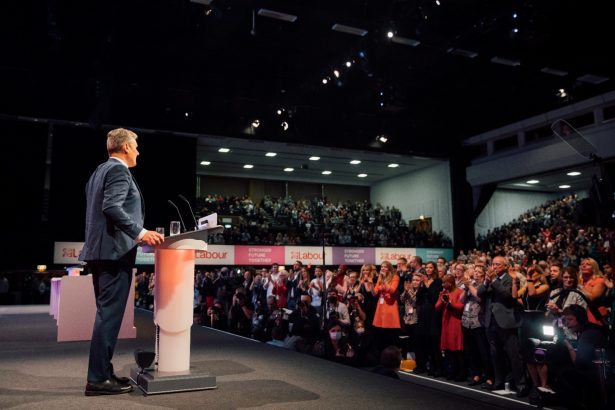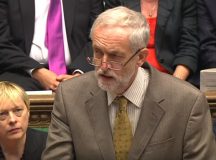I’ve spent most of the last week at the Labour Party’s Annual Conference, in my capacity as an elected member of Labour’s National Executive Committee.
This is far from my first time. With 27 conferences under my belt, I’ve spent a total of nearly half a year of my life in this weird alternative universe of compositing, reference backs, fringe meetings and receptions that only serve warm white wine.
As Fathom is focused on Israel, I’m going to write about the aspects of conference that impinge on Israel and antisemitism. But thanks to the Corbyn years, that’s almost all the conference. Even though Israel was only the subject of part of one short one hour floor debate and a few fringe meetings, everything else the party does at its annual meetup reflects a political division in which the handling of antisemitism, and particularly antisemitic anti-Zionism is a major factor.
The party is deeply factionalised. The easiest way to work out which faction someone supports is the lanyard they are using to hold their conference pass. An unofficial Palestine Solidarity Campaign (PSC) lanyard and you know the wearer is very likely to back the Corbynite group Momentum, an official one sponsored by the USDAW union and you know they are more likely to back Keir Starmer and the Labour to Win grouping.
Even the notorious hecklers during Keir’s speech, though their slogans may have focused on the £15 minimum wage demand, held up red cards distributed by ‘Labour Against the Witch-hunt’ (of antisemites), and a placard saying ‘Stop the Purge’ (of antisemites).
The biggest votes of the week were a package of rule changes proposed by Starmer. These look superficially dry stuff about nomination thresholds. In reality, they represent a belated attempt to bolt firmly shut the door that Ed Miliband opened in a previous set of reforms in 2014, and through which Jeremy Corbyn and his mass of supporters, including, as we later discovered, many antisemites, marched.
Leadership candidates will now need 20 per cent support from MPs, so fringe candidates who will be in conflict with the parliamentary party, like a certain J. Corbyn, need not apply. The notorious £3 registered supporters are gone, and only committed members with six months’ membership will get to vote for leader. The days of mass recruitment to outvote hard-working Labour activists with flotsam and jetsam washed in from the mailing lists of single-issue pressure groups like the PSC or far left micro-parties are gone. This all makes it far less likely that another leader with radical anti-Israel views can be elected (though I would never be so complacent again, as I thought it was impossible before 2015 too). It also means that a ‘moment’ when a leadership election sparks a mass re-entry into the party of the Hard Left is no longer possible.
The trigger ballot process for reselecting MPs is reformed, so that the travesty where one third of local branches can outvote the other two thirds to make an MP go through a full reselection is gone. This means MPs can be more balanced in their views on all subjects (including the Middle East), and look outwards to the electorate, not over their shoulders towards a minority of activists they have to appease.
The circus of conference debating 20 policy topics so there isn’t time to debate any of them properly and the fringe and esoteric can reach conference floor goes, as the number is reduced to 12. This would mean that next year the now perennial debate on Israel wouldn’t happen as it came outside the top 12.
These were big wins where Keir Starmer showed boldness, courage, and leadership, and he was rewarded with a conference that has consolidated his grip on the party and his reputation with the public. All this reduces the risk of a leadership challenge and a reversion to Corbynism.
A challenge to party General Secretary David Evans fell when he hit the ball out of the park with his speech and was rewarded with 57 per cent of conference affirming him in office. He now has a personal democratic mandate that no Labour General Secretary has had before, thanks to Momentum’s stunt of trying to move against him. Their arguments for removing him were all about the antisemitism crisis: claims he had silenced constituency parties that wanted to debate Corbyn’s suspension and the EHRC report, he has expelled too many antisemites, he has proscribed antisemitic organisations.
A rule change that would have given conference the right to restore the whip to MPs (who could they have had in mind?) was heavily defeated.
A new national Labour Students organisation was created, filling the void left after the sectarian shutdown of the old student structure, which had been a reliable ally for the Union of Jewish Students for three decades, and helped inculcate generations of Labour politicians and activists with a pro-Israel stance.
An already strong majority for Keir Starmer on Labour’s national executive committee (NEC) was consolidated, with the more mainstream Musicians’ Union replacing the very left-wing Bakers in the trade union section. The Bakers have now disaffiliated from Labour. Even this battle relates to antisemitism as Bakers’ Union President Ian Hodson faces expulsion from Labour for being a patron of the now proscribed ‘Labour Against the Witch-hunt’ group.
The rule changes required by the Equality and Human Rights Commission (EHRC) to set up a new independent disciplinary process to deal with antisemitism and other cases involving protected characteristics was passed by a whopping 74 per cent after superb and very moving speeches by Ruth Smeeth and Margaret Hodge. This is despite Momentum disgracefully whipping their supporters to oppose it, showing they are fundamentally not serious about tackling antisemitism.
As a result, the most emotional moment of conference came, with former MP Louise Ellman, who is Jewish and had been the Chair of Labour Friends of Israel (LFI), re-joining at the conference and receiving a standing ovation when Keir Starmer name-checked her in his speech. Louise’s speech to a packed room of hundreds of supporters at the Labour Friends of Israel reception felt like a cathartic moment where Jewish Labour members and their allies could, whilst acknowledging that there is still a massive antisemitism problem to resolve in the party, feel that the tide is moving very firmly in the right direction.
In contrast, the low point was Monday morning where there was a short debate on international issues, which included a motion on Israel. The motion had slipped through the priority ballot in quite a low placing, the beneficiary of a Corbyn-era inflation in the number of topics debated. It was moved by Young Labour, who had inserted highly problematic text into the composited motion so that it delegitimised Israel by speaking about an ‘ongoing Nakba;, ‘Apartheid’ and ‘sanctions’. There is a significant problem with Young Labour’s hard-line stance on Palestine, which included hosting PSC speakers during conference, and makes the organisation an unwelcoming environment for young Jewish members. The mover of the motion weaved in further delegitimising rhetoric into his speech, referring to ‘settler colonialism’ and implying a comparison of Israel to Franco’s Spain. Chair of LFI Steve McCabe gave a strong speech calling for a more balanced approach, probably the most pro-Israel speech made from conference floor in decades, but in vain as the motion passed by a two-thirds majority on an uncounted show of hands. This was partly because the major unions are all bound by policy already passed at their own conferences with similar terminology, even if some of their leaders are personally more pragmatic. It was also partly because the movers of a motion have a home advantage, being able to give far longer speeches, and there is no requirement for balance in the number of speeches for and against. Most delegates don’t read the text of motions closely and vote for everything put in front of them out of sympathy for the passion of the movers. I’m convinced, having seen delegates back two mutually contradictory Green New Deal motions that if there had been a pro-Israel motion in front of them they would have passed that as well as the anti-Israel one!
At least the optics of the debate were less hostile this year, with a firm ban on the waving of Palestinian, or any other, flags.
A few minutes of ranting is no way to make policy on as complex an issue as the Middle East. Fortunately, it isn’t the main way Labour makes policy.
The conference also passed a National Policy Forum report, the result of a more deliberative and evidence-based committee process, which was far more balanced on Israel, condemning Hamas rockets as well as air strikes, and calling for ‘negotiated, diplomatic settlement to the Israeli-Palestinian conflict based on a two-state solution: a safe and secure Israel, alongside a viable and sovereign Palestinian state.’ Delegates rejected a ‘reference back’ on this report, commending the works of anti-Zionist academic Ilan Pappe on a show of hands, and one undermining the two-state solution was defeated on a card vote by a 67 per cent to 33 per cent margin, this time with the unions opposing it.
This enabled Shadow Foreign Secretary Lisa Nandy to ignore the Young Labour motion and tell conference that ‘We owe it to the people of Palestine and Israel to take a fair and balanced approach that recognises there can only be peace through a safe and secure Israel existing alongside a sovereign and viable Palestinian state.’
I left conference feeling that significant progress has been made on tackling antisemitism, but there is still a mountain to climb. There is a backlog of 5,000 complaints that will take about a year to deal with through the party’s disciplinary process.
On Israel, the ability of otherwise sensible delegates to be taken in by rhetoric that is delegitimising and may even breach the IHRA definition of antisemitism – which defines as possible antisemitic, depending on context, ‘Denying the Jewish people their right to self-determination, e.g., by claiming that the existence of a State of Israel is a racist endeavour” – indicates a frighteningly shallow level of political education on the issue.
And worst of all, the Hard Left’s position on antisemitism resembles the Greek myth of the labours of Sisyphus. Momentum founder Jon Lansman, himself a Jew on the receiving end of antisemitism, rolled a massive ideological stone up the hill to get his comrades to understand left-wing antisemitism existed and needed to be tackled. As soon as he and his allies were removed from control of Momentum by a newer more radical faction, the stone has rolled straight back down to the bottom of the hill, and public discourse among the Corbynites has reverted to the rhetoric of three years ago around antisemitism being a ‘scam’, ‘purges’, ‘witch-hunts’, and Zionist conspiracies to stop Corbyn becoming PM. They may be increasingly marginalised and removed from power within Labour, but even if they are in the political wilderness, it’s not a healthy thing for them or the British body politic for them not to understand the reality and threat of antisemitism, and the need to be part of combating it, to be part of showing solidarity with its victims, not its perpetrators.




































